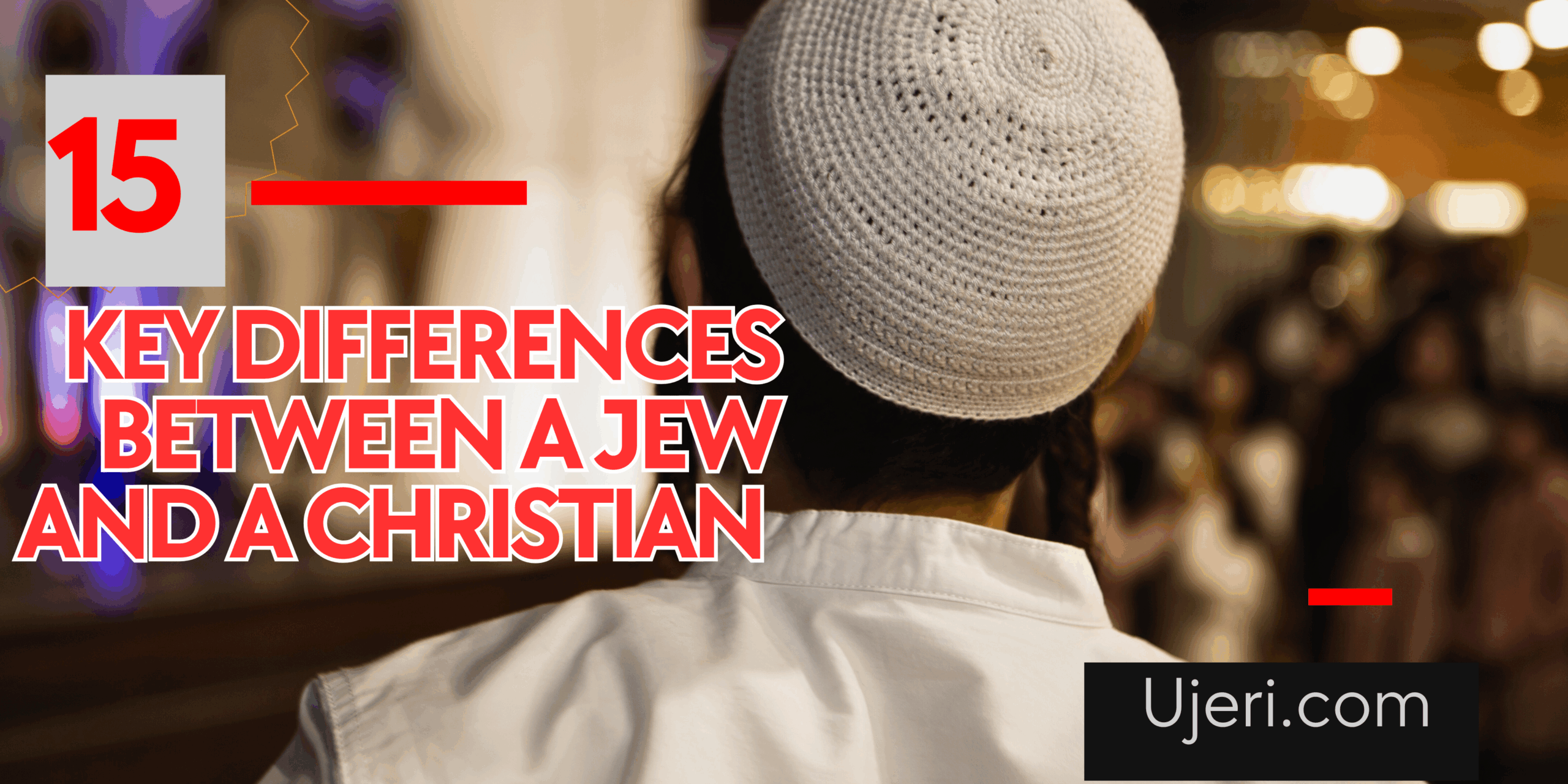Christianity and Judaism are two of the world’s oldest and most influential religions. They both believe in one God, share many of the same Scriptures in the Old Testament, and have similar moral teachings. However, the two faiths are not the same. Christianity and Judaism have major differences in belief, practice, and understanding of God’s plan.
In this article, we will look at 15 key differences between Christianity and Judaism, supported with clear explanations and a comparison table at the end for easy understanding.

1. View of Jesus
- Christianity: Jesus is the Son of God, Messiah, and Savior of the world.
- Judaism: Jesus is not the Messiah and not divine.
2. Messiah Concept
- Christianity: The Messiah has already come in Jesus Christ.
- Judaism: The Messiah is still to come in the future.
3. Scriptures
- Christianity: Old Testament + New Testament.
- Judaism: Hebrew Bible (Tanakh) only.
4. Salvation
- Christianity: Salvation comes by grace through faith in Jesus Christ (Ephesians 2:8-9).
- Judaism: Salvation is through faith in God, good works, repentance, and following the Law.
5. Law (Torah)
- Christianity: Jesus fulfilled the Law; Christians are under the New Covenant (Romans 10:4).
- Judaism: The Torah is still binding and central to Jewish life.
6. God’s Nature
- Christianity: Belief in the Trinity—Father, Son, and Holy Spirit (Matthew 28:19).
- Judaism: Strict monotheism, God is one (Deuteronomy 6:4).
7. Role of Jesus’ Death
- Christianity: Jesus died for the sins of humanity.
- Judaism: Jesus’ death has no role in salvation.
8. View of Sin
- Christianity: All people are born with original sin.
- Judaism: People are born innocent and have free choice between good and evil.
9. Prayer and Worship
- Christianity: Prayer often ends “in Jesus’ name.” Worship is centered on Christ.
- Judaism: Prayer is directed to God alone, never through Jesus.
10. Religious Leaders
- Christianity: Priests, pastors, ministers, bishops.
- Judaism: Rabbis.
11. Sacred Places
- Christianity: Churches, cathedrals, chapels.
- Judaism: Synagogues, Jerusalem, and the Western Wall.
12. View of Afterlife
- Christianity: Belief in heaven and hell; eternal life through Christ.
- Judaism: Belief varies—some believe in the World to Come, others focus more on life now.
13. Religious Holidays
- Christianity: Christmas, Easter, Good Friday, Pentecost.
- Judaism: Passover, Yom Kippur, Rosh Hashanah, Hanukkah.
14. Baptism and Rituals
- Christianity: Baptism and the Lord’s Supper (communion) are central practices.
- Judaism: Circumcision and bar/bat mitzvahs mark entry and maturity in faith.
15. Covenant with God
- Christianity: The New Covenant is through Jesus Christ.
- Judaism: The Covenant with Abraham and Moses still stands.
Comparison Table: Christianity vs Judaism
| Aspect | Christianity | Judaism |
|---|---|---|
| Jesus | Son of God, Messiah, Savior | Not Messiah, not divine |
| Messiah | Already came in Jesus | Still to come |
| Scriptures | Old + New Testament | Hebrew Bible (Tanakh) |
| Salvation | Faith in Christ, grace | Faith + good works + Law |
| Law | Fulfilled in Christ | Still binding |
| God’s Nature | Trinity | Strict monotheism |
| Jesus’ Death | For sins of the world | No role in salvation |
| Sin | Original sin | Born innocent, free will |
| Prayer | In Jesus’ name | To God alone |
| Leaders | Priests, pastors, bishops | Rabbis |
| Sacred Places | Churches, cathedrals | Synagogues, Jerusalem |
| Afterlife | Heaven and hell | Varies: World to Come or present life focus |
| Holidays | Christmas, Easter, Pentecost | Passover, Yom Kippur, Hanukkah |
| Rituals | Baptism, Communion | Circumcision, Bar/Bat Mitzvah |
| Covenant | New Covenant in Christ | Abrahamic and Mosaic Covenant |
Conclusion
Christianity and Judaism share roots in the Old Testament, but they differ greatly in how they see God, salvation, and Jesus Christ. While Christians believe Jesus is the Messiah and Son of God, Judaism does not accept Him in that role.
Understanding these differences is important for respect, dialogue, and deeper study of faith.







